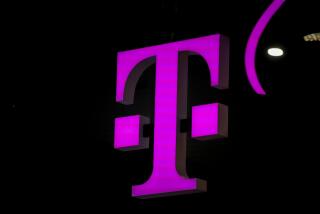Caution on MCI Merger
- Share via
The world of telecommunications has been shaken once again, this time by the announcement of a $115-billion merger between MCI WorldCom and Sprint Corp., the second- and third-largest long-distance telephone companies. This is the biggest yet in a string of mammoth mergers. The two companies and industry analysts believe that the merger, announced Monday, makes good business sense and will benefit stockholders of both companies. The federal regulators must make sure this is a good deal for consumers as well.
The feverish pace of mergers in the telecommunications industry over the past three years is driven by deregulation and the development of the Internet. The telecom landscape is changing so fast that even the country’s top regulator, Federal Communications Commission Chairman William Kennard, refuses to make predictions. But he is worried about one aspect of the MCI/Sprint merger--the concentration of long-distance telephone services in fewer hands.
Combined with AT&T;, which still has the biggest chunk of the business, the two companies would control nearly 80% of the market. The price war among the top carriers, which has led to the cutting of long-distance phone rates to just pennies per minute, could come to a sudden halt. But the long-distance phone business is developing as well. New competition is on the horizon from regional Bell companies, which are clamoring to get into the long-distance business, and from foreign telecom giants such as Deutsche Telekom, which under World Trade Organization rules must now be allowed into the U.S. market.
Kennard’s concern about competition in the long-distance market is justified, although MCI says the control of that market is not all that MCI WorldCom wants. Rather, by buying Sprint, it hopes to acquire one of the nation’s best mobile phone businesses, direct access to some 8 million homes and a new network capable of delivering high-speed data, video, wireless and phone services through a single connection. The MCI/Sprint fusion would offer customers one-stop telecom service. AT&T; is headed in the same direction with its acquisition of cable companies.
The emergence of the telecom super-carriers poses the biggest challenge for regulators in the long run. Of immediate concern in the MCI-Sprint merger, aside from diminished competition in the long-distance market, is the new company’s dominance of the Internet backbone, the network through which Internet services are delivered. Combined, the two companies would control about half of Internet backbone assets. To preserve competition, the regulators might require Sprint to sell its Internet network.
Blockbuster telecommunications deals are changing the face of the industry. The new telecom giants must now convince the regulators that consumers’ interests will not be lost in the shuffle.
More to Read
Inside the business of entertainment
The Wide Shot brings you news, analysis and insights on everything from streaming wars to production — and what it all means for the future.
You may occasionally receive promotional content from the Los Angeles Times.










